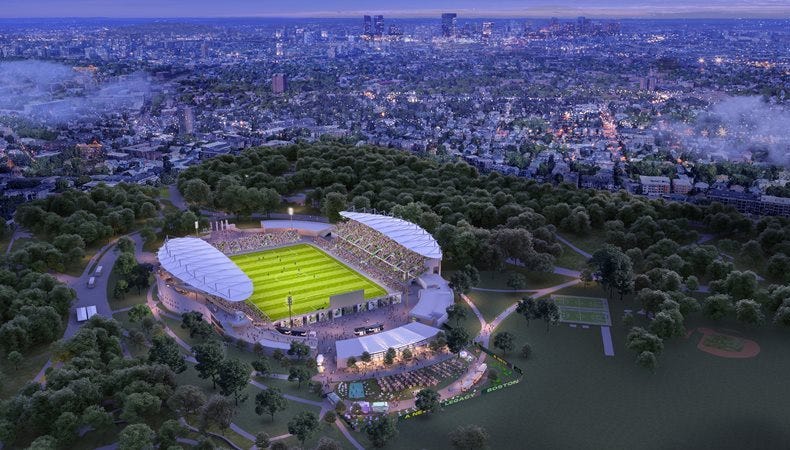White Stadium Trial Set to Commence
“The plaintiffs’ media campaign has misrepresented the facts, leading to public misconception about what, exactly, this project entails"
Monday proved to be a busy day for the White Stadium lawsuit parties as a Superior Court judge cast doubt on the stadium opposition’s legal standing.
Suffolk Superior Court Judge Matthew Nestor ruled in favor of Boston Unity Soccer Partners (BUSP) and the city’s pretrial motions that were submitted early Monday, adding that the plaintiffs “do not have standing” for one of their main arguments.
The Superior Court judge ruled that the Emerald Necklace Conservancy has no standing to bring a case against the defendants on the matter of whether or not the George R. White Trust — which owns White Stadium and the parcel of land on which it sits — can make a deal with the city.
“The White Fund was established for the benefit of the general public, and the Plaintiffs do not have individual interests in the White Fund distinct from that of the general public,” Nestor wrote in his decision.
“We are pleased with this initial ruling and look forward to resolving this matter in our favor through the rest of the judicial process,” said BUSP controlling owner Jennifer Epstein.
The defendants, which include BUSP, the City of Boston, and trustees of the George Robert White Fund, are set to appear in court on Tuesday to begin the trial concerning White Stadium’s use.
The plaintiffs in the lawsuit are the Emerald Necklace Conservancy, a non-profit organization that aims to maintain and protect parks within the Emerald Necklace, as well as 20 residents and park advocates who have coined themselves the “Franklin Park Defenders.” Their main goal is to prevent private use of the stadium.
The lawsuit largely revolves around two issues:
Whether White Stadium is subject to Article 97 of Massachusetts’ constitution, which is intended, in part, to prevent park land from being privatized
Whether the public-private partnership violates the George Robert White Fund Trust’s terms
George Robert White was a Boston philanthropist and established the George Robert White Fund for the city through his will when he died in 1922. The lawsuit parties have different interpretations of the will’s wording regarding use of funds and land ownership.
The city used the charitable fund to purchase a parcel within Franklin Park for the purpose of building a stadium in 1947. The defendants maintain Boston Public Schools has custody of the stadium, citing a 1950 state legislative vote which designated it a “school building and yard,” rather than parkland. This designation would exempt the land from the Article 97 process. Plaintiffs uphold that the parcel is still owned by the trust.
While White’s will mentions leasing land, it does not dictate whether private entities can be involved. Plaintiffs argue that the terms prohibit “joint undertakings,” but that portion of the will also specifies use of fund income, which the city and team will not be using for the renovation.
General Lawsuit Timeline
February 2024 - Plaintiffs file complaint including the following claims:
The public-private partnership would be in violation of the Trust because the project would “illegally transfer the public trust lands… to private parties”
Defendants did not comply with the Article 97 process
The group also called for the court to stop the project, halting any plans for demolition and construction, and to require the defendants to go through the Article 97 process, as well as to stop the city and trust from transferring possession of, control of, or right to the stadium to BUSP or other private entities.
March 2024 - Suffolk Superior Court Justice Sarah Weyland Ellis denies the plaintiffs’ request to halt the project, adding that the plaintiffs “are not likely to be successful on the merits of their claims.”
December 2024 - Discovery deadline is extended from December 6, 2024 to February 28, 2025.
January 2025 - Plaintiffs submit a second amended complaint one month after the White Stadium lease is signed.
The group included the timeline of conversations between the city and BUSP surrounding stadium use, which began months before the city requested renovation proposals from the public. Details from the lease and stadium usage agreement, such as incomplete traffic management plans and possible tax exemptions, were also added in the complaint.
March 13, 2025 - Both parties submit motions to exclude and include certain evidence and testimony in the trial.
March 17, 2025 - Defendants submit memorandum in opposition of plaintiffs’ motions. Eight hours later, plaintiffs submit their own memorandum in opposition to defendants’ motions.
Superior Court Justice Matthew Nestor files an order allowing the defendants’ motions and denying those of the plaintiffs, and says the plaintiffs do not have a standing on whether defendants are violating the trust.
BUSP released a statement ahead of the trial denying the plaintiffs’ claims.
“The plaintiffs’ media campaign has misrepresented the facts, leading to public misconception about what, exactly, this project entails,” the group said. “What is clear is that most community members agree renovation is necessary, even if they differ on the methods, and we can all agree that BPS students and the communities living around Franklin Park deserve investment that will have generational benefits, including the young female student-athletes who will have more access to sports through the expansion of the track, field, and related facilities.”




I learned more about the stadium deal in this article than from other media sources.
Is there a way to follow along live?